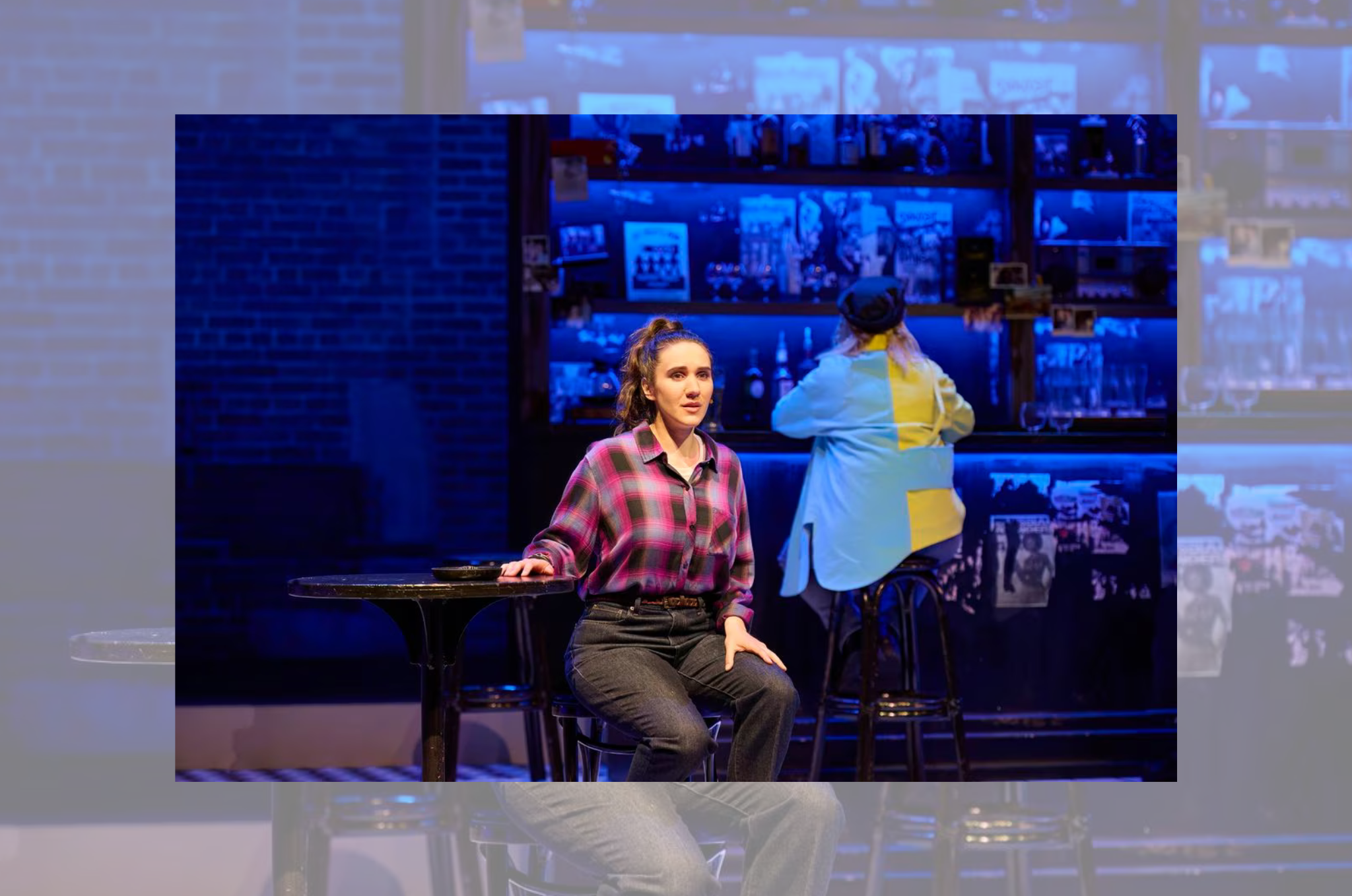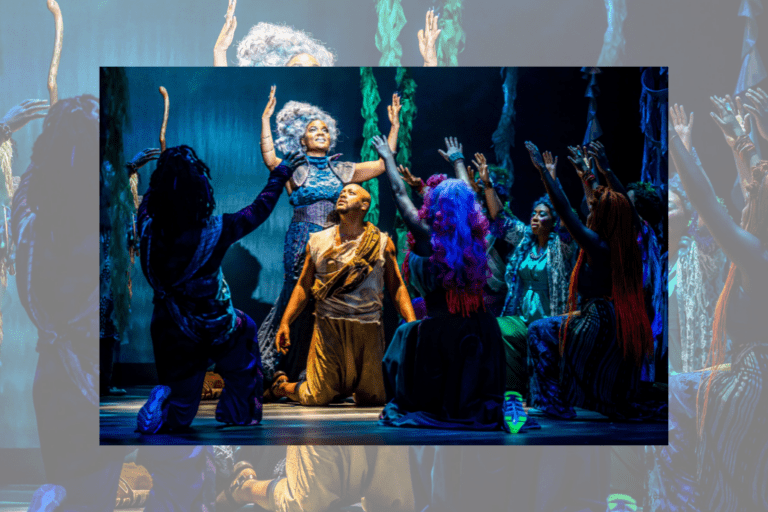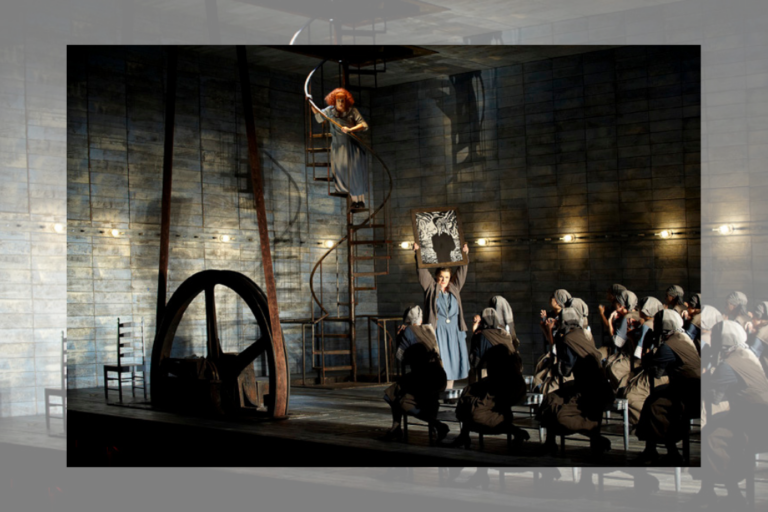REVIEW: Pomegranate at COC
From ancient Pompeii to an iconic 1980s lesbian bar downtown Toronto, the Canadian Opera Company’s Pomegranate, housed at the Joey and Toby Tanenbaum Opera Centre, follows an epic love story of two young women in search of solace and self-acceptance. Directed by Jennifer Tarver, composed by Kye Marshall, and with libretto by Amanda Hale, Pomegranate is sung in English and has a two hour and 25 minute runtime.
The Joey and Toby Tanenbaum Opera Centre is a dedicated COC space to workshop contemporary and new operatic works. The venue is an intimate branch of the COC, and well equipped to connect audiences to the underrepresented stories which rarely hit the main stage. Pomegranate is a jam-packed opera spanning thousands of years, mixing fantasy with memory to tell a powerful story that connects directly to the violent history of LGBTQ2S+ rights in Toronto.
The first act begins in 1981, outside the once very real lesbian Fly by Night Bar in Toronto. Cass (Danielle Buonaiuto) reminisces about a school trip to Italy, where she fell in love with Suzie (Adanya Dunn). The stage lightens into a fantasy version of Cass’ memory of her trip. Suddenly, we’re in ancient Pompeii, and Cass finds herself at the Villa of Mysteries in the Temple of Isis. This place of mystery is inhabited by a small ensemble of six women who play Dionysian wifes.
Kimberly Purtell makes use of warm and bright lighting at the beginning of the first actt, highlighting the mirrored arches on either side of Lorenzo Savoini’s minimalist set. In Cass’ fantasy, the Priestess (Teiya Kasahara 笠原 貞野) vows to keep Cass, newly named Cassia, and Suzie, now called Suli, safe from Roman intruder Marcus Quinius (Peter Barrett), who has plans to invade Pompeii and marry Suli against her will.
Act Two opens back at the Fly by Night Bar, where Kasahara as the Priestess transforms into Jules. Jules is inspired by Pat Murphy – a Torontotarian advocate who ran the Fly by Night in the late 70s and early 80s. Murphy is best known for creating a safe place for lesbian women to escape the oppression and stigmatization of homosexuality at this complex time in queer history. Kasahara’s particular attention to care and expressive voice in their portrayal of Jules plays beautiful homage to Murphy’s work and legacy.
The ensemble of women trade in their ancient Pompeii dresses for oversized jean jackets and teased ‘80s-styled hair (skillfully designed by Andjelija Djuric). The women prepare to protest for LGBTQ2S+ rights following the 1981 Toronto bathhouse raids, a series of brutal attacks by Toronto police that led to over 300 queer people being arrested at bathhouses in the city’s downtown core. As the women prepare to protest, Suzie faces a choice: her parents, who disapprove of her lifestyle, or a future with Cass.
While the two acts are quite different (both in design and sound), one part that remains constant throughout are the frameworks of the set. The stage designed by Lorenzo Savoini almost looks like a shallow pool, a physical symbol of broken safety as The Temple of Isis in ancient Pompeii and the 80s Fly By Night Bar in Toronto become dangerous. The double arches on either side of the stage both offer a portal to safety for the women in ancient Pompeii 80s Toronto, and a way back into the outside world of scrutiny where the women will inevitably return.
Marshall’s world-building music complements the poetic text. In the first act, the music errs towards whimsical, emphasizing the harp as though located deep in Cass’ dreams. Cass and Suzie’s duos in this world are entrancing, with Marshall’s compositions beautifully blending their voices together as a further statement of their love.
In the second act, the percussion picks up, bringing with it an 80s sort of groove. The tempo is fast and bluesy, and the sound of horned instruments matches the vibrant energy inside the bar. Cass and Suzie’s duets become more heated and less intertwined as family members interfere with their relationship. Even though the first and second act are musically different, Marshall has a unique talent to create two opposing sounding sonic worlds that share a common theme of hope that then gives way to heartbreak. In other words, both acts have motifs that are lustful and grand when Cass and Suzie are together, and moments of thin, breathy musical stillness when they’re pulled apart.
In some ways, though, the two acts feel disjointed, with a drastic change from visual minimalism to naturalistic grunge over intermission. While it’s exciting to watch what feels like two operas packed into one, each of the acts could be benefitted by more detail – I left wanting to know more about the lives of the Dionysian wives, and more about the history of the Fly By Night Bar and its regulars.
Despite some aesthetic disconnects, the opera’s overarching theme of LGBTQ2S+ people searching for safe places for centuries is strong throughout. Arriving at a timely moment in history, Pomegranate highlights the importance of LGBTQ2S+ people feeling safe in our community, especially when violence against queer youth and elders alike remains at an all-time high.
Overall, I was fascinated with the mix of fantasy and almost documentary-style opera Pomegranate offers. The opera is sure to hit close to home for those in Toronto who remember the fight for LGBTQ2S+ rights in the late 70s and early 80s. The multifaceted operatic work proves how contemporary operatic pieces can centre queer characters in new and productive ways. Hopefully it will inspire the community to learn more about this city’s history of LGBTQ2S+ safe places.
Pomegranate closed on June 4. To learn more, click here.
Intermission reviews are independent and unrelated to Intermission’s partnered content. Learn more about Intermission’s partnership model here.












Comments